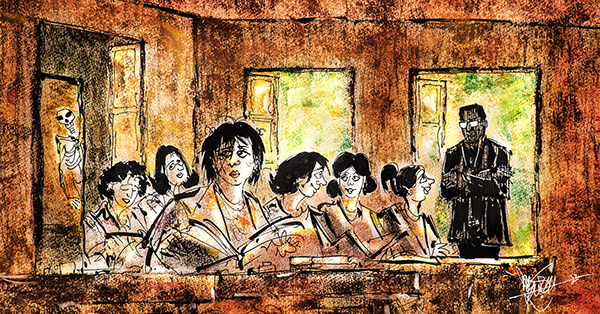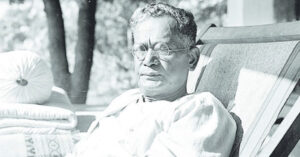KATHAM BARI
Swapan Rex Katham. There was something about the name.
It was 1984, and I was in Class Four. The man, slim and smart, came and divided our classroom into four groups. There were four rows of desks in that dimly-lit classroom next to the biology laboratory. None of us, nine and 10-year-olds, liked the skeleton that stood behind the green door of the lab. When we went to the toilet, we cupped our eyes and pressed our faces on the windowpane – though we were scared, we were also curious, we wanted to be surprised by a secret life of the skeleton, of an afterlife. I think we did not like our classroom. It did not help that our class teacher had been changed a few times. We were together, but also scattered. It was as if we were waiting for Swapan Rex Katham to congeal us into a group.
Our surnames changed overnight. My best friend of that time became K2, I Kanchenjunga, another Everest. The rows we sat in became the mountain peaks they had been named after by this man we would come to call Katham Sir. He turned us competitive, but he also energised us – he made us grow closer to our books, for the questions that we were asked were from them, so that every book turned into the subject of a quiz. Like batsmen we waited, padded up – the question could come anytime, we just had to be prepared.
Siliguri seems so tiny then – a few neighbourhoods connected not by streets and two main roads but the mood of rickshaw pullers. It was their decision to ferry us or not that was the unit of distance, not kilometres. Our connection to the world was fragile, more imagined than real. It was in this environment that a figure like Swapan Rex Katham arrived in our lives. The middle-name fascinated us – we had met it only once, in the Phantom Comics: Rex was the foster son of The Ghost Who Walks, after all. It was the charm of the foreign, of both ‘Rex’ and ‘Katham’ that attracted us. I can now see that Katham Sir – whose surname many mispronounced as ‘Kathal’ because of their unfamiliarity with the word – brought in the sound of the unknown to our lives. As we moved to middle and high school, Katham Sir moved with us too. He became Geography teacher, but, much before that, he was aligning our lives to different parts of the planet – not just the highest mountain peaks after which he named the four rows in class, but more. When angry – or in mock-anger – with us, he would call us ‘Patagonian fools’ and ‘Taklamakan baboons’. So, it was not just to mountains but also to deserts that he was connecting our lives – to the faraway, to the elsewhere, to a life and lives outside our small town. It was perhaps the best gift that a geography teacher can give to their students.
Prefaced by tea estates, soon one meets the forest with its old trees, some places still so dense that light might not reach the forest floor. One might also meet elephants and other wild animals. As I passed through the place last winter, I thought of Katham Sir – this place that belonged to his ancestors, that had given him his surname and his identity, and from where he had first begun to see the world, the connections he had wanted to forge with it from here.
Many years later, when my parents were able to buy a car, we would, on a detour from a winter picnic, drive through Gajaldoba and Mainaguri, and chance upon a road with a sign that said ‘Katham Bari’. My brother and I looked at each other as if a secret, not very different from those we had met in the Phantom comics, had suddenly been revealed to us. We pleaded with our father to take that route. That is how we discovered the magic of this little-known place.
Prefaced by tea estates, soon one meets the forest with its old trees, some places still so dense that light might not reach the forest floor. One might also meet elephants and other wild animals. As I passed through the place last winter, I thought of Katham Sir – this place that belonged to his ancestors, that had given him his surname and his identity, and from where he had first begun to see the world, the connections he had wanted to forge with it from here.
I also thought of a poem by Saubhik De Sarkar, a poet from north Bengal. It is called “Katham Bari”. In it we experience ‘a stray beam of moonlight’ flowing ‘through the windscreen towards your shirt,/ the way our windpipes brim over’, ‘the tyre’s dense mud’, ‘and far away that thing that divides water’. ‘Overtaking laziness and excuses’, the moonlight enters through the shirt. ‘The breeze had bent very low, and one could feel the thin bleeding and the incoherent smell of salt.’ I can only paraphrase this beautiful poem – the deep subterranean experience of the intimacy of Katham Bari, an intimacy where the place enters us like light finds a way to enter our bodies.
কাঠাম বাড়ি
উইন্ডস্ক্রিনের ভেতর দিয়ে তোমার শার্টের দিকে
উড়ে এসেছিল জ্যোৎস্নার রেণু,
যেভাবে উপচে পড়ে ফেলে যাওয়া শ্বাসনালী
টায়ারের গাঢ় কাদা, অনেকদূরের প্রিয় জলবিভাজিকা
শনাক্তকরণের অজুহাত আর আলস্য ডিঙ্গিয়ে
তোমার শার্টের ভেতর ঢুকে পড়েছিল জ্যোৎস্নার প্রকরণ
খুব নীচু হয়ে এসেছিল বাতাস
রক্তপাতের লীন আর লবণের অসংলগ্ন ঘ্রাণ
Illustration by Suvamoy Mitra





